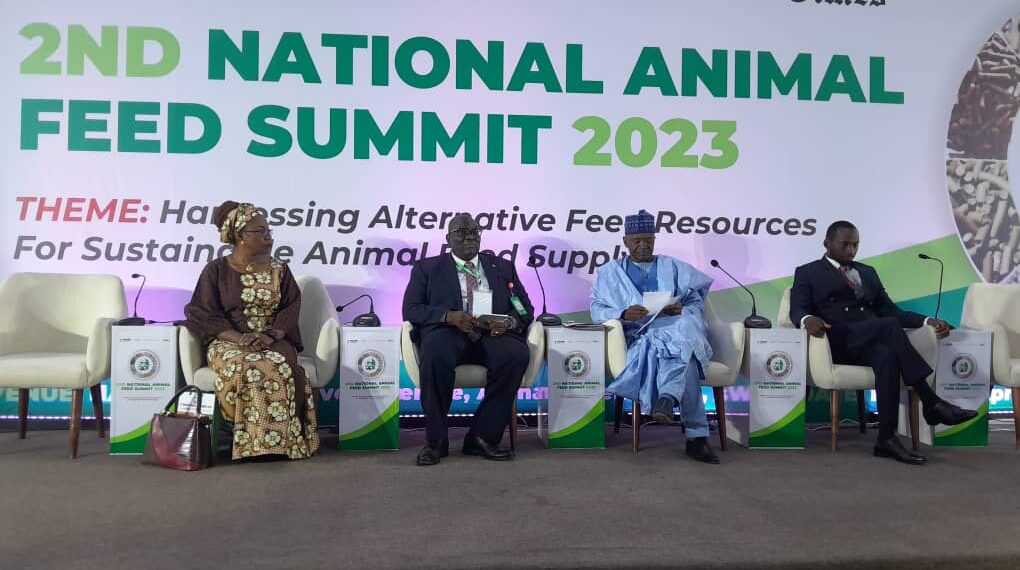The Federal Government and stakeholders in the agriculture sector have called on Nigerian farmers to look for alternative source of feeds for their animals to enable the country attain sustainable food security. The Minister of Agriculture and Rural Development, Dr. Mohammed Abubakar made this known at the second National Animal Feed Summit, held in Abuja. The programme was organised by the Centre for Journalism Innovation and Development (CJID) and Sahel Consulting in collaboration with the ministry and other relevant agencies. The theme of the summit was, “Harnessing Alternative Feed Resources for Sustainable Animal Feed Supply”.
Dr. Abubakar said it was time farmers embraced technology for improved animal feeds while the President, Nigerian Society for Animal Production, Prof. Francis Abeke, said that Nigeria must harness and process alternative feed resources available nationwide to enable the country reduce cost of food production. Stakeholders in the agricultural sector have seized the opportunity to engage in a dialogue at the Animal Feed Summit, to address some challenges facing the industry and how to develop alternative feed sources to achieve animal feed sustainability. The Executive Director of CJID, Dr. Tobi Oluwatola, while highlighting the importance and aim of the summit, said feed represents 70 per cent of livestock production.
He observed that Nigeria was producing less than 25 per cent of its demand for livestock, hence there is the need to buckle up in feed production. “We, in collaboration with the Ministry of Agriculture and Rural Development and Sahel Consulting, decided for this particular dialogue that animal feed is a very critical aspect of the value chain because it represents 70 per cent of the cost of livestock production, and livestock production is where we get our proteins and we are really lagging behind on that; we are producing less than 25 per cent of our demand, so we really need to buckle up in that respect and that is why that aspect has been tackled. But again, it doesn’t end here, the conversation, next year, it will be another aspect that we will pick in other sectors as well”, saying they hope to achieve self-sufficiency in animal feed production at the end of the summit and create millions of jobs, especially for the youth.
Oluwatola added that “The goal we hope to achieve is to make sure that we have self-sufficiency in terms of animal feed production, make sure that we create jobs. In the animal feed industry, we believe we can create 20 million jobs. We also hope to ensure that the cost of livestock production in general comes down, and that may mean that there will need for some subsidies”, he added. The Senior Programme Manager at Sahel Consulting, Fisayo Kayode, said this year’s summit was about looking beyond the conventional feed sources to seeing how they can also integrate farmers into understanding the importance of sourcing alternative feed resources. She disclosed that the reason why Sahel Consulting was partnering with the Ministry of Agriculture and CJID, was to ensure that they also putting out there, what the farmers are facing, what their needs are and how the different stakeholders; both public and private sectors can meet their needs through partnerships, collaborations, and coming up development initiatives that can promote productions as well as local and foreign investments.
“We are glad to work with the Federal Ministry of Agriculture and the CJID on this programme. This is the second summit for the National Animal Feed. We are happy that we are here for the second time because feed access is very critical for farmers. We work on a project called Advancing Local Diary Development in Nigeria and we have seen how smallholder diary farmers struggle to access feed. This year, we are looking beyond the conventional feed sources, to seeing how we can also integrate farmers into understanding the importance of sourcing alternative feed resources. In our livestock world, we like to say that feed security is also food security because as we are aware in Nigeria we mostly rely on animal-sourced food to meet our protein requirements, and because of our growing population, we need to ensure that we have enough availability of livestock and sourced feed.
“So, we need to ensure that we are producing enough feeds to feed these livestock, because without quality feed, they wouldn’t produce as much as we are require to work towards the availability of animal sourced protein for the human population”, Kayode added. On his part, the Programmes Research Officer, Agriculture Desk at CJID, Ntiedo Ekott added that “this is the second National Feed Summit that we bring stakeholders together to discuss on the National Feed Policy document and also to harness the alternative feed resources supply and to look at the core challenges that affect food and feed security in the country. We are hoping to get the policy document on feed and food supply ready on time, then to push it to the government for effective implementation. The core of the whole thing is food sufficiency and food security in the country”.
The summit served as the convergence platform of key stakeholders from the private and public sectors, feed millers such as toll, commercial and on-farm, and the academia, to chart the way forward for the development of Nigeria’s feed sector. It had primary focus on feed value chain development, National Animal Feed policy document, National Strategic Feed Reserve and National Alternative Feed Ingredient Development. It would be recalled that the first edition of the Animal Feed Summit was held in September 2021 in Abuja and a draft feed policy document was developed. Some of the critical issues raised then were the need to strategically-develop a comprehensive feed sector database, harness crop residues to boost feed security, safeguard the environment, and prioritise efforts and investment in harnessing alternative feed resources, among others.



